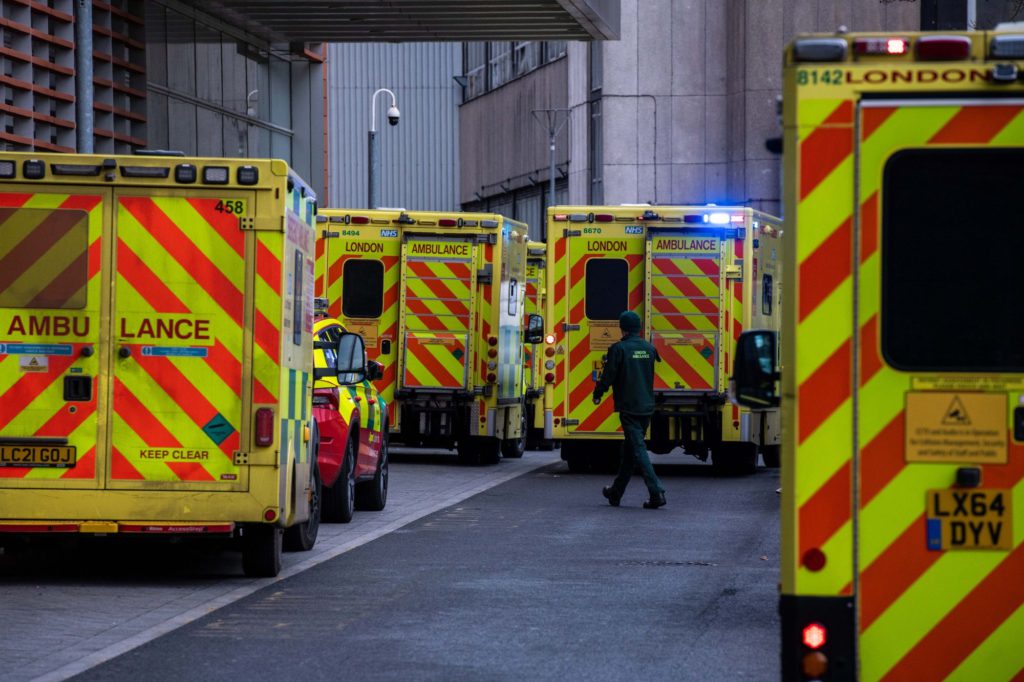People in Britain have been told to drink less alcohol, avoid “risky activity” and call 999 only if there’s a life threatening situation, as nurses and ambulance workers go on strike over pay.
(Bloomberg) — People in Britain have been told to drink less alcohol, avoid “risky activity” and call 999 only if there’s a life threatening situation, as nurses and ambulance workers go on strike over pay.
Will Quince, minister for health and secondary care, said he has “been really clear with unions that there is a minimum service level” that they need to provide during the industrial action, with staff expected to attend the most pressing emergencies.
Still, he accepted there will be disruption to crucial health services during Wednesday’s strike by ambulance staff, which follows the nurses’ second walkout on Tuesday.
The minister said “it is important where people are planning any risky activity, I would strongly encourage them not to do so.”
Quince also told the BBC that people shouldn’t contact the emergency services for problems that aren’t life threatening. They can call 999 if they have chest pains, he added.
Separately, a senior health service director said Britons could help by “drinking responsibly” or checking up on vulnerable neighbors, the Press Association reported.
Alongside Health Secretary Steve Barclay, Quince met unions on Tuesday afternoon but there were no further discussions about pay, according to the labor groups.
Onay Kasab, Unite’s national lead officer, said the meeting was “entirely pointless” due to the government’s refusal to negotiate over pay. Ministers are insisting they cannot go beyond an independent recommendation from earlier in the year.
Kasab also said members are committed to covering emergency calls and will leave picket lines if any local services cannot cope.
Nonetheless, Laura Hart, a nurse on a picket line, said it was “a scary time to be unwell at the moment” due to pressure on the health system.
Military Drivers
The country’s National Health Service faces a deepening crisis, with nurses threatening more strikes in the months to come. The military is on standby Wednesday to send 600 drivers and 150 support staff to fill in for striking ambulance workers, but they can’t drive above the speed limit or pass red traffic lights.
A further 625 military personnel are on standby to cover Border Force strikes over Christmas.
The joint actions by nurses and ambulance workers add to a growing crisis in the NHS, which is struggling with staff shortages and waiting lists for operations. The UK faces labor unrest on a variety of fronts over the holiday season, with postal, transport and other workers also taking action.
“The government needs to listen,” said James Coop, an ambulance worker who joined the nurses’ picket line on Tuesday to show support for his health service colleagues. “And until they listen, we’ll keep striking.”
Food Banks
Last week, nurses on the picket line told Bloomberg News that they were resorting to food banks or eating food intended for their patients to get by on salaries that start at £27,055 ($33,300) or £32,466 in inner London for newly qualified nurses.
Barclay, the health secretary, toured King’s College Hospital in London on Monday, where he was confronted by the mother of a three-year-old-daughter with cystic fibrosis, who told him that she had witnessed staff “worked to the bone.”
However, during the visit he maintained that the government would not budge on the offer announced in July that would see the average nurse’s pay increase by around 4% to 5%. The RCN is asking for 19%, which is five percentage points above inflation as measured by the retail price index.
–With assistance from Alex Morales.
(Adds detail following meeting with unions, and further quotations from ministers.)
More stories like this are available on bloomberg.com
©2022 Bloomberg L.P.










